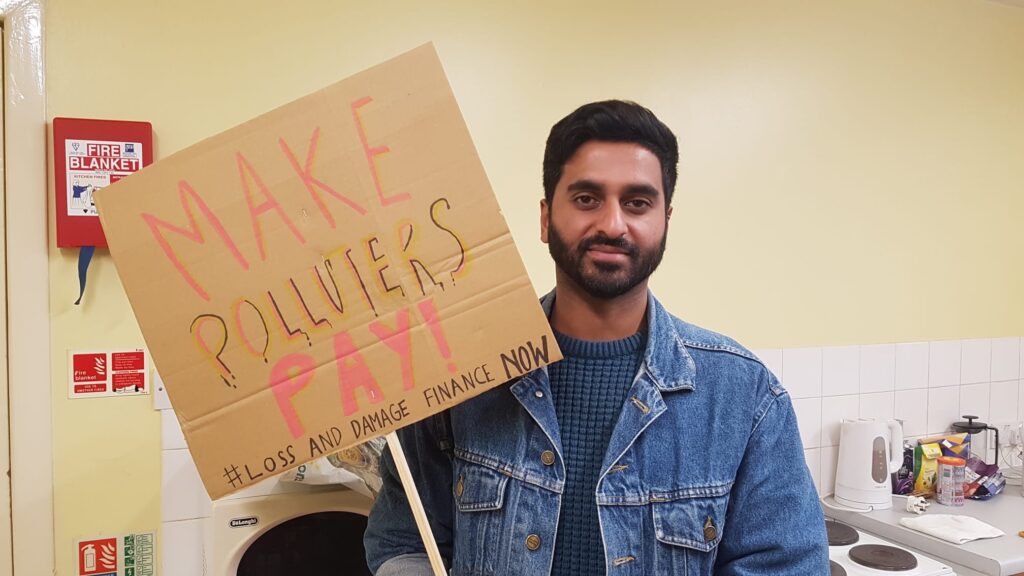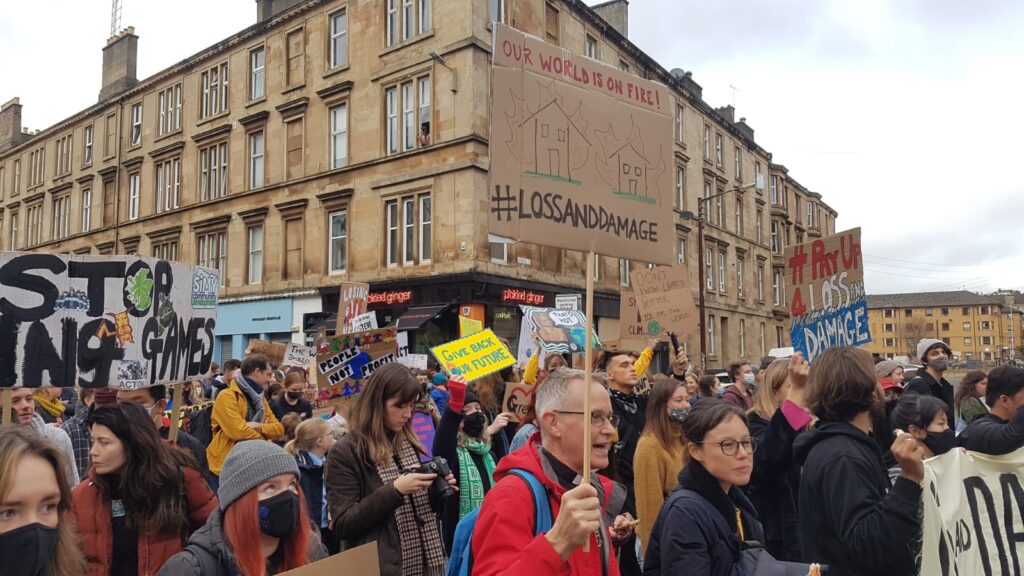Lifting our eyes to the future

As part of our year-end roundup, we’re publishing a series of personal reflections from core members of the Faith for the Climate team on their experiences at COP26. This one’s by our Movement Builder, Rosh Lal. Since joining Faith for the Climate in January, Rosh has brought his gifts, experience and passion in leading our interfaith workshops and capacity-building work, as well as our climate justice campaigns. Rosh also volunteers for Steel City Welcome, a project to resettle a refugee family in Sheffield.
“What do we want?”
“Climate justice!”
“When do we want it?”
“NOW!”
The person holding the placard and leading the chant couldn’t have been more than 12 years old, but they were shouting as loud as any adult at the march, their neck straining with the effort. We were stood amongst a sea of people stretched along the entire length of a central Glasgow high street. The faith bloc that I was marching with included Quakers with banners, Muslims with placards, Christians singing hymns and activists from the Global South who had travelled great distances to demand new finance for climate-related loss and damage. Also amongst this bloc were people I had met in the flesh for the first time who had started the year as colleagues and were now marching with me as friends and allies. Despite the wind, the rain and the heavy historical burden of the COP26 talks, I didn’t want to be anywhere else in the world at that moment.
Like anyone else who attended or had been following the COP, I came away conflicted about what it means for our collective future. On the one hand, It confirmed my sense that the COP alone will not ensure we build the world we so desperately need: free of climate injustice and an extractive economic model that enriches so few whilst imperilling everyone else. I had my deepest fears confirmed by the final text of the COP in Glasgow. Though it was much heralded for its explicit mention of reducing fossil fuel production for the first time, the fact this was noteworthy at all is a damning indictment of what these decades of talks have produced.
I was also dismayed to see Great Power politics determining the contours of the negotiations. The US was obstructionist, as usual, explicitly in terms of delivering climate finance, and the rich world’s PR machine was successful in shaping the narrative that painted India and China as the villains of the conference. I was perhaps naïve to hope that maybe this COP would be different, what with the increasing signs of climate catastrophe scarring the summer of 2021 in the rich world and the new atmosphere of emergency that 18 months of a pandemic has produced. But I should have known better than to expect a political class beholden to corporate and fossil fuel interests to suddenly find a backbone when they have never demonstrated having one before.
Despite these crushing affirmations of the mountain we yet still have to climb, I did not come away from Glasgow without hope. It was to be found both in the conference – from the moral courage of small island leaders like Mia Mottley, the Prime Minister of Barbados, who spoke with a resounding clarity of the need for the end of climate colonialism and the discarding of the lives of those in the Global South – and most importantly outside the conference, in the vibrant multiplicity of voices demanding an end to the death sentence of business-as-usual.
It is worth taking a moment to chart how far the climate justice movement has come. When I first started getting involved in climate activism in the early 00’s, I was driven by the global injustice of the problem. It sickened me that the people who had done the least to create the crisis would be the worst affected. I have family that live in India, and friends that live in other climate vulnerable countries. To think of their current struggles being compounded by the climate crisis infuriated me. Since then I have been part of the Climate Camp outside Heathrow, volunteered for Friends of the Earth, joined Extinction Rebellion direct actions and advocated for a Green New Deal.
When I first got involved in climate action, the climate was still dismissed as a fringe issue that was only the concern of over-privileged ascetics. In a tumultuous decade, shaped by an increasingly capricious climate, we have seen the climate justice movement grow into a movement of movements; a social force that recognises that everything is a climate issue: work, housing, food, transport, trade, health, racism, the economy. The civilizational transformation we need to avert the climate crisis calls for nothing short of a reckoning with history. With an accounting for the moral debt the rich world owes to the poor, that those with high consumption lifestyles owe to those with low consumption lifestyles and with what we all owe to the non-human world.
Surrounded by the thousands of others in Glasgow who hold the promise of a new world within them, I was heartened and set on course again. The climate justice movement is not going anywhere, in fact it is growing stronger by the day. We are setting the terms of the debate and the red-lines that cannot be crossed. We are committed to foregrounding those who are not in the rooms where power is hoarded and zealously protected. We are committed to bringing others into the movement, so we can build a counter-power to that of Big Capital and of cynicism. We continue the reckoning with ourselves over all we have lost and stand to lose if we do nothing, but our eyes are lifted to a future we’re building together, where we know we have so much more to win.
Read Kamran Shezad’s reflection

